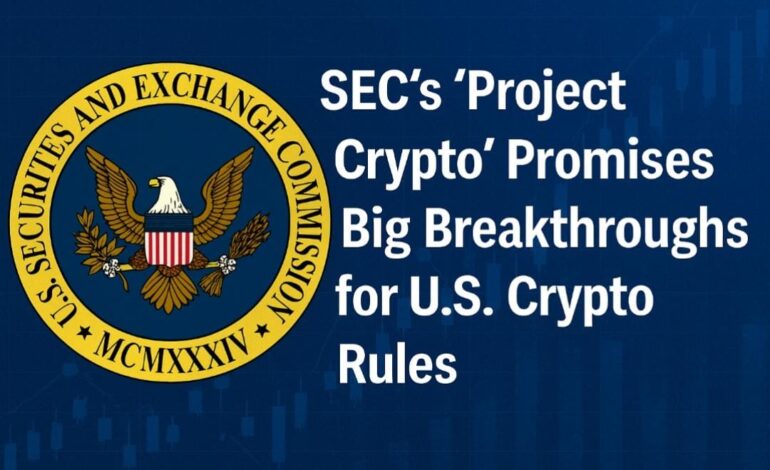
SEC’s ‘Project Crypto’ Promises Big Breakthroughs for U.S. Crypto Rules
In a landmark move, the U.S. Securities and Exchange Commission (SEC) has unveiled Project Crypto, a sweeping initiative to modernize its regulatory framework for digital assets. Announced by SEC Chair Paul Atkins, the project aims to address the growing gap between outdated financial rules and the fast-evolving world of cryptocurrencies.
“Many of the Commission’s legacy rules do not make sense in the twenty-first century—let alone for on-chain markets,” Atkins stated during the press briefing. “The SEC must revamp its rulebook so that regulatory moats do not hinder progress and competition.”
What Is Project Crypto?
Project Crypto introduces a new era of SEC crypto regulations with key changes designed to remove uncertainty and foster innovation:
- Eased Licensing: Brokerages can now offer multiple asset classes—including crypto—under a unified license.
- Market Structure Clarity: Most digital assets will be categorized as commodities, not securities, ending years of ambiguity.
- Innovation Grace Periods: Early-stage projects and ICOs may qualify for temporary exemptions, allowing development without fear of immediate legal action.
- Self-Custody Protections: Legal rights for individuals to self-custody their crypto assets will be formally recognized.
- DAO Flexibility: The SEC will not force businesses to form DAOs merely to sidestep regulation, easing startup burdens.
A Strategic Shift in U.S. Policy
Project Crypto reflects a dramatic pivot from the SEC’s earlier “regulation by enforcement” approach. Under Atkins’ leadership, the Commission has already taken a more crypto-friendly stance:
- Approved multiple crypto ETFs
- Clarified that staking income from proof-of-stake chains is not a securities transaction
- Allowed in-kind ETF redemptions to improve cost efficiency for institutions
White House and CFTC Backing
The White House’s July report—“Strengthening American Leadership in Digital Financial Technology”—calls for joint oversight between the SEC and the Commodity Futures Trading Commission (CFTC). It grants the CFTC sole jurisdiction over spot crypto markets while encouraging SEC collaboration for broader oversight.
The report also touches on:
- Stablecoin Regulations
- Crypto Taxation Reforms
- Illicit Finance Controls
- Banking and AML Rules
Together, these steps suggest a united federal effort to modernize U.S. financial laws for the blockchain era.
Conclusion
Project Crypto marks a historic regulatory shift for the United States. It not only brings long-overdue clarity to the crypto space but also aligns with global efforts to embrace digital innovation. With support from the White House and the CFTC, these SEC crypto regulations could set a new global standard for digital asset governance.
Also Read: The Hidden Health Insurance Risk After 60






